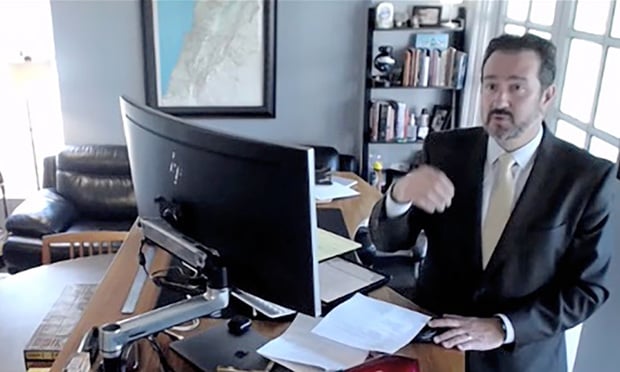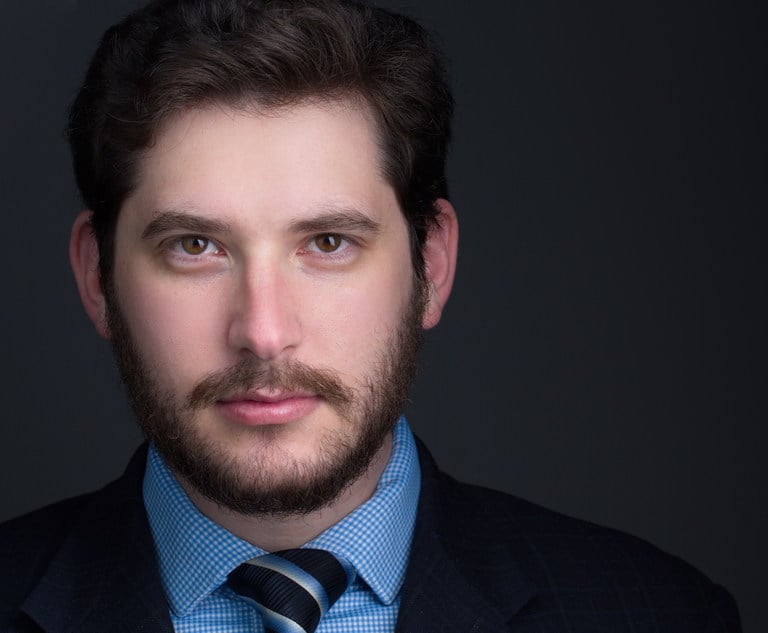Could Litigation Change Forever? Zoom Trials Already Cutting Costs for Litigants
"I feel certain that had this trial had been conducted in a courthouse, it would have taken longer, and it would have been a larger inconvenience, particularly for the nonparty witnesses, than it was," said Brian Barakat of Barakat Law in Coral Gables.
May 05, 2020 at 12:51 PM
4 minute read
 Brian Barakat of Barakat Law in Coral Gables in a recent Zoom trial. Courtesy photo.
Brian Barakat of Barakat Law in Coral Gables in a recent Zoom trial. Courtesy photo.
When this South Florida commercial landlord-tenant dispute went to a bench trial amid COVID-19 court closures, the parties could only forge ahead online.
But now, this remote litigation has proved to be a boon for clients, who no longer have to pay witnesses to scale the state, search for parking or wait for hours in a hallway.
And attorney Brian Barakat, of Barakat Law in Coral Gables, hopes post-pandemic litigation will adapt.
Stay-at-home orders prompted the Florida Supreme Court to temporarily suspend rules requiring all parties to agree before witnesses can appear via video conference, but Barakat says the success of online litigation could make those rules redundant.
"It is my hope that when we come out of this pandemic that rule will be changed forever, and allow the court to make a decision whether they wish to accept testimony by video conference without the agreement of another side that maybe just wants to just delay the matter," Barakat said. "This has saved a great deal of money for the clients."
While the key players will probably always want to attend in person, Barakat said perhaps others should have a choice.
"For third-party witnesses, particularly ones that live far away, there's a real value in using this technology that's been here for quite a long time to make the administration of justice more efficient," he said.
Barakat teamed with Jordan Lewin of the Lewin Law Group in Coral Gables to represent barbershop Wild Card Men's Haircuts of Florida LLC, sued by its landlord Kendall Square Mall LLC after a joint build-out project turned sour and its tenants canceled the lease.
Shutts & Bowen attorneys Matthew Chait and Sean Smith in West Palm Beach represented the landlord but declined to comment. The barber shop countersued, alleging it lost out on profits because of delayed opening.
The trial lasted two days and featured about 110 exhibits and five witnesses, according to Barakat, who said it would have been a different story if it was business as usual.
"I feel certain that had this trial had been conducted in a courthouse it would have taken longer, and it would have been a larger inconvenience, particularly for the nonparty witnesses, than it was," Barakat said. "Nobody had to wait at all. We texted a witness, he clicked on his computer and turned away from whatever work he was doing, from South Dade, North Dade, Sarasota or Broward, wherever people were chiming in from."
Of course, there was one participant with a sound problem, caused by calling in through a phone and computer simultaneously. But Barakat says he's discovered a hack.
"If you wait until after the meeting has commenced and you join, you'll receive a participant ID, and you can call in from your telephone with your AirPods," he said "That is the best quality sound."
The atmosphere was collaborative and visual aids took center stage in the litigation, Barakat said — now that no one's wheeling in a television, projector or giant cardboard cut-out — though it's important to consider that each participant might have a different sized screen.
"I think the judge and the parties were much more focused on the documents than they were on the witnesses," Barakat said.
"Most of the trial there was a document on the screen, and although everybody's face was also on the screen, I think the attention was more turned to the evidence than on the face of the witness.
Miami-Dade Circuit Judge Spencer Eig presided over the case and has yet to rule.
Read more:
Get Used to Online Litigation: It Could Become Florida's New Normal
This content has been archived. It is available through our partners, LexisNexis® and Bloomberg Law.
To view this content, please continue to their sites.
Not a Lexis Subscriber?
Subscribe Now
Not a Bloomberg Law Subscriber?
Subscribe Now
NOT FOR REPRINT
© 2025 ALM Global, LLC, All Rights Reserved. Request academic re-use from www.copyright.com. All other uses, submit a request to [email protected]. For more information visit Asset & Logo Licensing.
You Might Like
View All
Tragedy on I-95: Florida Lawsuit Against Horizon Freight System Could Set New Precedent in Crash Cases
2 minute read
'You Lied to the Jury': Veteran Awarded $5 Million in Defamation Case Against CNN
4 minute read
Vedder Price Shareholder Javier Lopez Appointed to Miami Planning, Zoning & Appeals Board
2 minute readLaw Firms Mentioned
Trending Stories
- 1Plaintiff Argues Jury's $22M Punitive Damages Finding Undermines J&J's Talc Trial Win
- 2Bannon's Fraud Trial Delayed One Week as New, 'More Aggressive,' Defense Attorneys Get Ready
- 3'AI-Generated' Case References? This African Law Firm Is Under Investigation
- 4John Deere Annual Meeting Offers Peek Into DEI Strife That Looms for Companies Nationwide
- 5Why Associates in This Growing Legal Market Are Leaving Their Firms
Who Got The Work
J. Brugh Lower of Gibbons has entered an appearance for industrial equipment supplier Devco Corporation in a pending trademark infringement lawsuit. The suit, accusing the defendant of selling knock-off Graco products, was filed Dec. 18 in New Jersey District Court by Rivkin Radler on behalf of Graco Inc. and Graco Minnesota. The case, assigned to U.S. District Judge Zahid N. Quraishi, is 3:24-cv-11294, Graco Inc. et al v. Devco Corporation.
Who Got The Work
Rebecca Maller-Stein and Kent A. Yalowitz of Arnold & Porter Kaye Scholer have entered their appearances for Hanaco Venture Capital and its executives, Lior Prosor and David Frankel, in a pending securities lawsuit. The action, filed on Dec. 24 in New York Southern District Court by Zell, Aron & Co. on behalf of Goldeneye Advisors, accuses the defendants of negligently and fraudulently managing the plaintiff's $1 million investment. The case, assigned to U.S. District Judge Vernon S. Broderick, is 1:24-cv-09918, Goldeneye Advisors, LLC v. Hanaco Venture Capital, Ltd. et al.
Who Got The Work
Attorneys from A&O Shearman has stepped in as defense counsel for Toronto-Dominion Bank and other defendants in a pending securities class action. The suit, filed Dec. 11 in New York Southern District Court by Bleichmar Fonti & Auld, accuses the defendants of concealing the bank's 'pervasive' deficiencies in regards to its compliance with the Bank Secrecy Act and the quality of its anti-money laundering controls. The case, assigned to U.S. District Judge Arun Subramanian, is 1:24-cv-09445, Gonzalez v. The Toronto-Dominion Bank et al.
Who Got The Work
Crown Castle International, a Pennsylvania company providing shared communications infrastructure, has turned to Luke D. Wolf of Gordon Rees Scully Mansukhani to fend off a pending breach-of-contract lawsuit. The court action, filed Nov. 25 in Michigan Eastern District Court by Hooper Hathaway PC on behalf of The Town Residences LLC, accuses Crown Castle of failing to transfer approximately $30,000 in utility payments from T-Mobile in breach of a roof-top lease and assignment agreement. The case, assigned to U.S. District Judge Susan K. Declercq, is 2:24-cv-13131, The Town Residences LLC v. T-Mobile US, Inc. et al.
Who Got The Work
Wilfred P. Coronato and Daniel M. Schwartz of McCarter & English have stepped in as defense counsel to Electrolux Home Products Inc. in a pending product liability lawsuit. The court action, filed Nov. 26 in New York Eastern District Court by Poulos Lopiccolo PC and Nagel Rice LLP on behalf of David Stern, alleges that the defendant's refrigerators’ drawers and shelving repeatedly break and fall apart within months after purchase. The case, assigned to U.S. District Judge Joan M. Azrack, is 2:24-cv-08204, Stern v. Electrolux Home Products, Inc.
Featured Firms
Law Offices of Gary Martin Hays & Associates, P.C.
(470) 294-1674
Law Offices of Mark E. Salomone
(857) 444-6468
Smith & Hassler
(713) 739-1250







